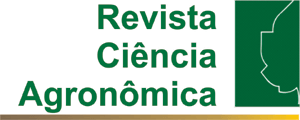ABSTRACT
Peanut cultivation in the northeast of Brazil has been badly affected by salts accumulating in the irrigation water; in this respect, the use of plant mulch is one way of mitigating salt stress. The aim of this study was to evaluate the effect of irrigation using brackish water under different mulching strategies on productivity and water use efficiency in the peanut. The experiment was carried out under field conditions in Redenção, in the state of Ceará, in a randomised block design of split-plots with five replications, in which the plots corresponded to two levels of electrical conductivity of the irrigation water (0.8 and 4.0 dS m-1), and the subplots to six mulching strategies based on the phenology of the crop (MS1: mulch throughout the cycle; MS2: flowering stage; MS3: appearance of the gynophore; MS4: pod formation; MS5: final flowering stage; MS6: no mulch). The following were determined at the end of the experimental cycle: commercial, non-commercial and total number of pods, number of grains per pod, pod length and diameter, productivity and water use efficiency. Irrigation with lower-salinity water, together with mulching during the phenological stages of the peanut, affords better productive performance and greater water use efficiency. Salt stress reduced the length and diameter of the pods and had a negative effect on productivity and water use efficiency, both with and without the use of plant mulch during the phenological stages.
Keywords:
Arachis hypogaea; Production; Salinity

 Thumbnail
Thumbnail
 Thumbnail
Thumbnail
 Thumbnail
Thumbnail
 Thumbnail
Thumbnail
 Thumbnail
Thumbnail

 Lowercase letters compare the mean values of the ECw levels in each mulching strategy, and uppercase letters compare the mean values of the different mulching strategies at the same level of ECw by Tukey’s test (p ≤ 0.05). MS1: mulch throughout the cycle; MS2: flowering stage - 25 DAS; MS3: appearance of the gynophore - 36 DAS; MS4: pod formation - 47 DAS; MS5: final flowering stage - 65 DAS; MS6: no mulch
Lowercase letters compare the mean values of the ECw levels in each mulching strategy, and uppercase letters compare the mean values of the different mulching strategies at the same level of ECw by Tukey’s test (p ≤ 0.05). MS1: mulch throughout the cycle; MS2: flowering stage - 25 DAS; MS3: appearance of the gynophore - 36 DAS; MS4: pod formation - 47 DAS; MS5: final flowering stage - 65 DAS; MS6: no mulch
 Lowercase letters compare the mean values of the ECw levels in each mulching strategy, and uppercase letters compare the mean values of the different mulching strategies at the same level of ECw by Tukey’s test (p ≤ 0.05). MS1: mulch throughout the cycle; MS2: flowering stage - 25 DAS; MS3: appearance of the gynophore - 36 DAS; MS4: pod formation - 47 DAS; MS5: final flowering stage - 65 DAS; MS6: no mulch
Lowercase letters compare the mean values of the ECw levels in each mulching strategy, and uppercase letters compare the mean values of the different mulching strategies at the same level of ECw by Tukey’s test (p ≤ 0.05). MS1: mulch throughout the cycle; MS2: flowering stage - 25 DAS; MS3: appearance of the gynophore - 36 DAS; MS4: pod formation - 47 DAS; MS5: final flowering stage - 65 DAS; MS6: no mulch
 Lowercase letters compare the mean values of the ECw levels in each mulching strategy, and uppercase letters compare the mean values of the different mulching strategies at the same level of ECw by Tukey’s test (p ≤ 0.05). MS1: mulch throughout the cycle; MS2: flowering stage - 25 DAS; MS3: appearance of the gynophore - 36 DAS; MS4: pod formation - 47 DAS; MS5: final flowering stage - 65 DAS; MS6: no mulch
Lowercase letters compare the mean values of the ECw levels in each mulching strategy, and uppercase letters compare the mean values of the different mulching strategies at the same level of ECw by Tukey’s test (p ≤ 0.05). MS1: mulch throughout the cycle; MS2: flowering stage - 25 DAS; MS3: appearance of the gynophore - 36 DAS; MS4: pod formation - 47 DAS; MS5: final flowering stage - 65 DAS; MS6: no mulch
 Lowercase letters compare the mean values of the ECw levels in each mulching strategy, and uppercase letters compare the mean values of the different mulching strategies at the same level of ECw by Tukey’s test (p ≤ 0.05). MS1: mulch throughout the cycle; MS2: flowering stage - 25 DAS; MS3: appearance of the gynophore - 36 DAS; MS4: pod formation - 47 DAS; MS5: final flowering stage - 65 DAS; MS6: no mulch
Lowercase letters compare the mean values of the ECw levels in each mulching strategy, and uppercase letters compare the mean values of the different mulching strategies at the same level of ECw by Tukey’s test (p ≤ 0.05). MS1: mulch throughout the cycle; MS2: flowering stage - 25 DAS; MS3: appearance of the gynophore - 36 DAS; MS4: pod formation - 47 DAS; MS5: final flowering stage - 65 DAS; MS6: no mulch